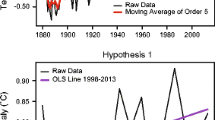Abstract
Uncertainty in the trajectories of the global energy and economic systems vexes the climate science community. While it is tempting to reduce uncertainty by searching for deterministic rules governing the link between energy consumption and economic output, this article discusses some of the problems that follow from such an approach. We argue that the theoretical and empirical evidence supports the view that energy and economic systems are dynamic, and unlikely to be predictable via the application of simple rules. Encouraging more research seeking to reduce uncertainty in forecasting would likely be valuable, but any results should reflect the tentative and exploratory nature of the subject matter.
Similar content being viewed by others
References
Ascher W (1979) Forecasting: an appraisal for policymakers and planners. Johns Hopkins University Press, Baltimore
Asimov I (1991) Prelude to Foundation. Bantam, New York (Originally published in 1988 by Doubleday)
Charmes J (2006) Measurement of the contribution of informal sector/informal employment to GDP in developing countries; some conceptual and methodological issues. Expert Group on Informal Sector Statistics, Paper #01. United Nations Economic and Social Commission for Asia and the Pacific
Craig P, Gadgil A, Koomey JG (2002) What can history teach us? A retropsective examination of long-term energy forecasts for the United States. Annu Rev Energy Environ 27:83–118
DeCanio SJ (2003) Economic models of climate change: a critique. Macmillan, New York
Garrett TJ (2009) Are there basic physical constraints on future anthropogenic emissions of carbon dioxide? Clim Change. doi:10.1007/s10584-009-9717-9
Grübler A (2003) Technology and global change. Cambridge University Press, Cambridge
Johnson S, Larson W, Papageorgiou C, Subramanian A (2009) Is newer better? Penn world table revisions and their impact on growth estimates. Center for Global Development Working Paper #191
Keller K, Miltich LI, Robinson A, Tol RSJ (2007) How overconfident are current projections of anthropogenic carbon dioxide emissions? Fondazione Eni Enrico Mattei Working Paper #39
Koomey JG, Craig P, Gadgil A, Lorenzetti D (2003) Improving long-range energy forecasting: a plea for historical retrospectives. Energy J 24(4):75–92
Maddison A (2003) The world economy: volume 2: historical statistics. OECD, Paris
Marchetti C (1977) Primary energy substitution models: on the interaction between energy and society. Technol Forecast Soc Change 10:345–356
Marchetti C, Nakicenovic N (1979) The dynamics of energy systems and the logistic substitution model. IIASA, Vienna, IIASA Report #RR-79–13
McGarity TO (2010) The cost of greenhouse gas reductions. In: Driesen DM (ed) Economic thought and US climate change policy. MIT, Cambridge
Nakicenovic N et al (2000) Special report on emissions scenarios: a special report of working group III of the intergovernmental panel on climate change. Cambridge University Press, Cambridge
Organization for Economic Cooperation and Development (OECD) (2010) Source OECD Database. http://www.sourceoecd.org. Accessed 1 September 2010
Scher I, Koomey JG (2010) Is accurate forecasting of economic systems possible? Clim Change. doi:10.1007/s10584-010-9945-z
Schipper L (1976) Raising the productivity of energy utilization. Annu Rev Energy 1:455–517
Smil V (2000) Perils of long-range energy forecasting: reflections on looking far ahead. Technol Forecast Soc Change 65:251–264
Smil V (2003) Energy at the crossroads: global perspectives and uncertainties. MIT, Cambridge
Smil V (2010) Energy transitions: history, requirements, prospects. Praeger, Santa Barbara
Sorrell S (2007) The rebound effect: an assessment of the evidence for economy-wide energy savings from improved energy efficiency. UK Energy Research Centre Report
Sorrell S (2009) Jevons’ Paradox revisited: The evidence for backfire from improved energy efficiency. Energy Policy 37:1456–1469
Weyant JP (2000) An introduction to the economics of climate change policy. Pew Center on Global Climate Change, Washington
Author information
Authors and Affiliations
Corresponding author
Rights and permissions
About this article
Cite this article
Cullenward, D., Schipper, L., Sudarshan, A. et al. Psychohistory revisited: fundamental issues in forecasting climate futures. Climatic Change 104, 457–472 (2011). https://doi.org/10.1007/s10584-010-9995-2
Received:
Accepted:
Published:
Issue Date:
DOI: https://doi.org/10.1007/s10584-010-9995-2




